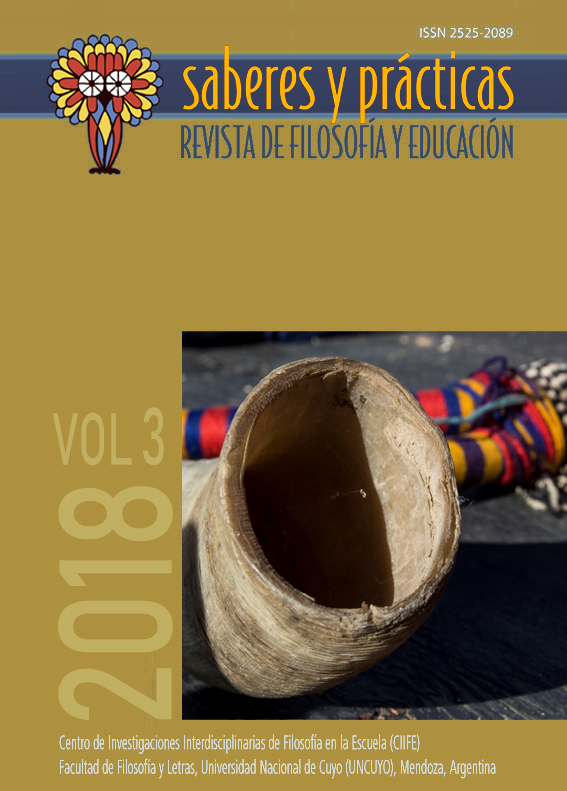When the recognition of diversity legitimizes inequality
Keywords:
Intercultural education, Difficulties, Proposals, Indigenous communitiesAbstract
In the present work we review part of a text resulting from the development of a research project referring to experiences of teachers postulated in intercultural education and bilingualism in IES N º 1, based in the towns of La Quiaca (northern border) and Abra Pampa.
The conditions regarding educational policies in the national and provincial levels, in regard to Intercultural Bilingual Education, have worsened what seems to merit a new analysis of some issues raised by the participants in the project, who identified difficulties with they found in their task, trying to focus on intercultural perspectives. To this we must add that for a long time, but especially now, the rights of indigenous communities are seriously jeopardized by the advance of different forms of transnational and predatory exploitation of goods that house their territories. This is combined with a sustained attempt to fragment and criminalize their struggles.
We make some proposals tending to favor a broader view than the existing epistemic categories allow us, as well as the assessment of the possibility of concrete utopias that promote more inclusive and fair alternatives.
Downloads
References
Acosta, Y. 2005.Sujeto y democratización en el contexto de la globalización. Montevideo: Norma-Comunidad.
Balibar, Etiene. 2013. Ciudadanía. Bs.As. Adriana Hidalgo Ed.
De Anquín, Ana. 2008. Zona inhóspita. Salta: EUNSa.
Díaz, Raúl. 2001. Trabajo docente y diferencia cultural. Bs. As.: Minio y Dávila
Díaz, Raúl. y Villarreal, J. 2009. "Extender la interculturalidad a toda la sociedad: reflexiones y propuestas desde el sur argentino" Cuadernos Interculturales. Vol. 7. Nº 13.Universidad de Valparaíso. Chile.
Díaz, Raúl; Rodrígues de Anca, A. y Villarreal, J. 2010 "Caminos interculturales y educación: aportes al debate desde la Provincia de Neuquén" en Hirsch, S. y Serrudo, A. (comps.) La Educación intercultural bilingüe en Argentina. Buenos Aires. Noveduc.
Díaz, Raúl. 2012. "La educación intercultural bilingüe en Argentina. Identidades, lenguas y protagonistas", disponible en Centro de documentación sobre evaluación y calidad educativa – CEADEL, http://ceadel.org.ar/centrodoc/?p=143
Follari,Roberto. 2012. La alternativa neopopulista.Rosario: Homo Sapiens.
Hirsch, Silvia M., 2010. "Pensando la Educación Intercultural Bilingüe en contextos pluriétnicos y plurilingüísticos" en Hirsch, S. y Serrudo, A. (comps.) La Educación intercultural bilingüe en Argentina. Buenos Aires: Noveduc.
Ley de Educación Nacional Nº 26.206/06.
López, Luis E. 2004. Cognición, cultura, lengua y aprendizaje: una introducción para planificadores de la educación en contextos multilingües y multiculturales. Revista de Educación Intercultural Bilingüe- Qinasay. Año 2. Nº 2. Cochabamba. PROEIB Andes-GTZ
López, Luis. 2005. "Igualdad con dignidad. Hacia nuevas formas de actuación con la niñez indígena en América Latina". En Educación intercultural bilingüe: debates, experiencias y recursos. Colección Educar CD 3. Ministerio de Educación Ciencia y Tecnología. Buenos Aires.
López, Luis E. 2006. Desde arriba y desde abajo: visiones contrapuestas de la EIB en AL. Revista de Educación Intercultural Bilingüe- Qinasay Año 4. Nº4. Cochabamba. PROEIB Andes-GTZ
Onghena, Yolanda. 2014. Pensar la mezcla. Un relato intercultural. Barcelona: Gedisa.
Perlo, Claudia. 2004. "Pedagogía intercultural. Un espacio de encuentro". En Sagastizábal, M. de los A. (ed.) Diversidad cultural y fracaso escolar. Educación intercultural: de la teoría a la práctica. Buenos Aires: Novedades Educativas.
Roig, A. 2002.Ética del poder y moralidad de la protesta. Mendoza: Ediunc.
Rubinelli, María L. y Tapia, D. (coord.) 2012. Voces entre los cerros. S.S.Jujuy: EdiunJu.
Salas Astrain, R. 2006. "Educación intercultural, profesores de educación media y contextos urbanos" en Amegeiras, A. y Jure (Comp.) Diversidad cultural e interculturalidad. Buenos Aires. UNGS-Prometeo.
Stavenhagen, R. 2004 "Pueblos indígenas: ente clase y nación". En Castro Lucic, Milka. Los desafíos de la interculturalidad: identidad, política derecho. Santiago: Universidad de Chile.
Wallis, Cristóbal. 2010. "Discurso y realidad de la EIB en comunidades wichi del Pilcomayo, Salta. ¿Es factible la interculturalidad en la escuela pública?". En Hirsch, S. y Serrudo, A. (comps.) La Educación intercultural bilingüe en Argentina. Buenos Aires. Noveduc.
Downloads
Published
How to Cite
Issue
Section
License

This work is licensed under a Creative Commons Attribution-NonCommercial-ShareAlike 2.5 Argentina License.





















